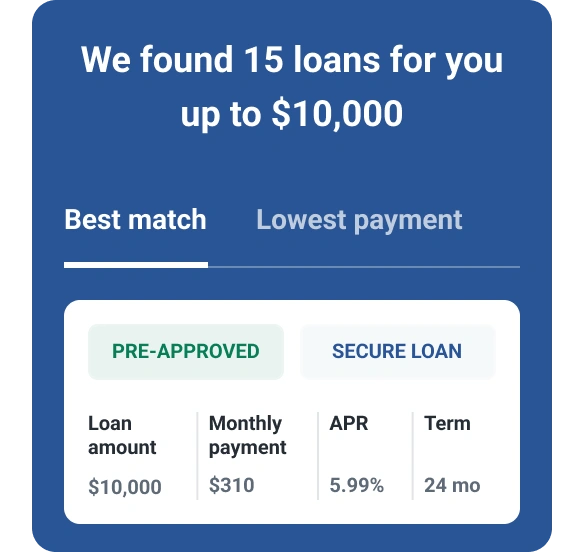Can You Refinance a Personal Loan?
Quick Answer
Yes, you can refinance a personal loan if you meet lender requirements. After you’re approved for a new loan, you can use the proceeds to pay off your existing loan.

One of the main reasons borrowers take out personal loans is to pay off high-interest debt with a lower interest rate loan. Along the same lines, you might consider refinancing your current loan if you find a loan offering you a lower interest rate.
You can refinance a personal loan by prequalifying for a new loan, submitting an application and using the funds to pay off your old loan. Understanding the advantages and disadvantages of personal loan refinancing and how it might affect your credit can help you decide if it's a good option.
When Should You Consider Refinancing a Personal Loan?
You may wonder how soon you can refinance a personal loan. Generally, you can refinance a personal loan once you start making payments. But be sure to check your current loan's terms for any restrictions preventing you from refinancing.
Deciding whether to refinance a personal loan will likely depend on your unique financial situation. Weigh the following pros and cons of personal loan refinancing to help decide if you should replace your current loan with a new one.
Pros of Refinancing a Personal Loan
Like refinancing any loan, choosing to refinance your personal loan comes with some advantages.
- Save on interest. If your credit score is higher than when you first applied for your personal loan, you may qualify for a lower interest rate. Doing so could help you save money over the life of the loan so long as you keep the same repayment term.
- Change your repayment term. Refinancing into a new loan with a longer repayment term could lower your monthly payments and make them more manageable. Conversely, if you can afford the higher payments, refinancing to a shorter loan term could save you money in interest charges overall.
- Get a larger loan. Can you refinance a personal loan for more money? Yes. Depending on your credit, you may qualify for a personal loan with a higher borrowing limit, potentially up to $100,000.
- Stabilize your interest rate. If your current personal loan has a variable interest rate, market fluctuations can cause your rates to rise or fall. You could avoid unpredictable rates by switching to a personal loan with a fixed interest rate that remains the same over the life of the loan.
Cons of Refinancing a Personal Loan
Of course, refinancing isn't for everyone. Consider the following disadvantages of personal loan refinancing before you sign on the dotted line.
- You may incur a prepayment penalty. Check with your existing loan's terms to determine if your lender will penalize you for paying off your loan balance early.
- The new loan may come with an origination fee. Many lenders charge an origination fee ranging from 1% to 8% of the loan amount to process your loan. These fees are deducted from your loan amount, so make sure there are enough funds left over to pay off your first loan.
- You could pay more interest over time. While extending your loan term can help you lower your monthly payment, you could end up paying more money in interest over the life of the loan.
- It could impact your credit score. When you apply for a new loan, your lender will likely pull your credit, which counts as an inquiry on your credit report. Hard inquiries can temporarily drop your credit score by five points or less.
How to Refinance a Personal Loan
You can refinance a personal loan through a traditional bank, credit union or online lenders. You can even refinance your loan with the same bank if they allow it. If you're ready to refinance your personal loan with your current bank or another lender, follow these six steps:
1. Determine How Much Money You Need
Make sure your new loan has a borrowing limit high enough to pay off your current loan. Remember, your lender may charge a prepayment penalty, and your new loan may come with an origination fee, both of which you should account for when you run your numbers. You'll want to ensure any penalties and fees don't negate the benefits of refinancing.
2. Review Your Credit Report and Credit Score
Before you start shopping for a new loan, consider getting your credit report and credit score to find out where your credit stands. Keep in mind, lenders typically advertise the lowest rates—the ones they reserve for borrowers with the best credit. You may not receive the advertised rate if your credit score is less than exceptional.
3. Shop and Compare Rates and Terms
Prequalify with multiple lenders to see the personal loan rates and terms that may be available to you. Prequalifying allows you to compare loan offers without affecting your credit score. Make sure your comparisons are apples-to-apples for the same loan amount and repayment term and take into account any applicable loan fees.
4. Submit Your Application
Once you single out a loan offer as the best for your needs, fill out an application and provide any requested supporting documents, such as your personal identification, Social Security number, pay stubs and account statements.
If a bank or credit union approves your personal loan, you should receive the funds within one to five days. Many online lenders fund your loan as soon as the same day or the next business day.
5. Pay Off Your Existing Loan
While your lender may transfer the personal loan funds to your account, other lenders may pay off your original loan on your behalf. You may qualify for interest rate reductions for opting to have the lender directly pay off your loan, so check your terms carefully before making a decision. Remember to check your account to confirm the first loan is closed and no balance or additional fees remain.
6. Make Payments on Your New Loan
When you receive funds for the new loan, your repayment period begins. It's a wise practice to set up automatic payments to ensure you never miss a payment.
How Refinancing a Personal Loan Affects Your Credit
Refinancing your personal loan can impact your credit score in a couple of ways:
- Hard inquiries: When you refinance your personal loan, the lender performs a hard check of your credit report, which can negatively influence your score. As mentioned above, the dip in your score is usually minor and temporary. It's worth noting, when you shop for a single type of loan within a specific time frame, like 14 days, the credit scoring companies may count your applications as a single inquiry for score calculating purposes. When multiple inquiries take place within a short time—14 days for VantageScore® credit score and 45 days for FICO® ScoreΘ—the scoring models know you're comparison shopping and count it as one individual inquiry.
- Length of credit history: How long you've managed open credit accounts makes up 15% of your FICO® Score. This scoring factor includes the age of your oldest account, how long it's been since you've opened an account and the average age of all your accounts. If your personal loan represents one of your oldest accounts, refinancing it may negatively affect your credit score by decreasing the length of your credit history and the average age of your accounts.
The good news is you may recover your original credit position by making consistent on-time payments on your new loan.
Should You Consider Refinancing Your Personal Loan?
A personal loan refinance may be worth pursuing if the new loan leaves you in better financial shape. Run the numbers and make an apples-to-apples comparison with your current loan and any new loan you're considering. If the new loan can reduce your interest charges, make payments more affordable or shorten your loan term, refinancing may make sense.
If the loan offers you receive have higher interest rates than your current loan, you might consider pausing your refinancing efforts to improve your credit. Then, you can refinance when your credit score is higher and you're eligible for more attractive rates. That said, rising interest rates due to economic factors could make a refinance unattractive even if you have a high credit score. One way to potentially raise your FICO® Score instantly is by using Experian Boost®ø. This feature gives you credit for responsibly paying bills like your phone, utilities and streaming services. It also gives you access to your free Experian credit report and FICO® Score.
Need a personal loan?
Whether you're looking to eliminate debt or access cash fast, compare personal loan offers matched to your credit profile.
Start now for freeAbout the author
Tim Maxwell is a former television news journalist turned personal finance writer and credit card expert with over two decades of media experience. His work has been published in Bankrate, Fox Business, Washington Post, USA Today, The Balance, MarketWatch and others. He is also the founder of the personal finance website Incomist.
Read more from Tim

